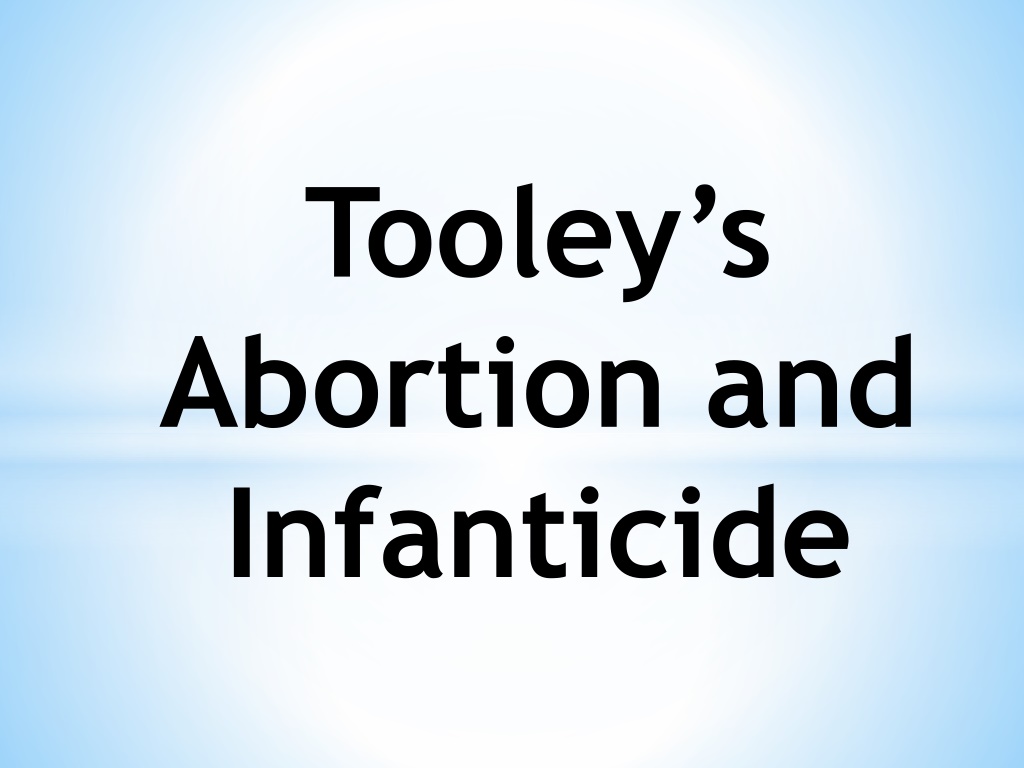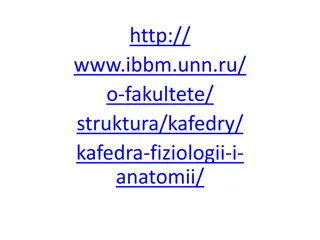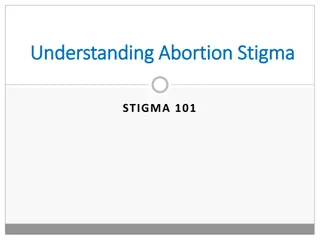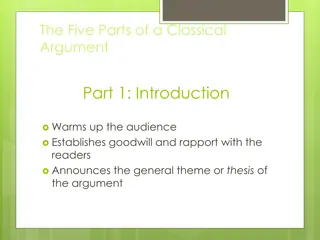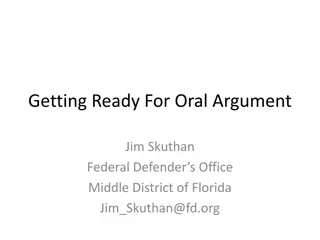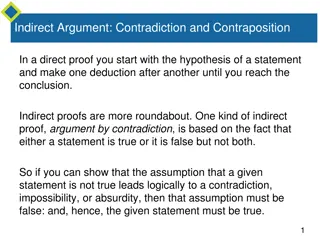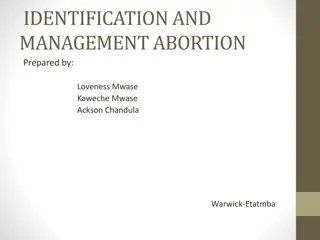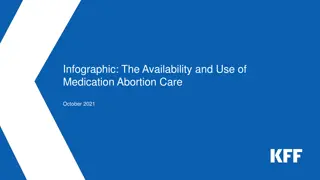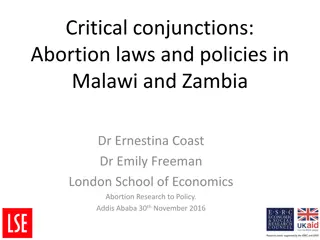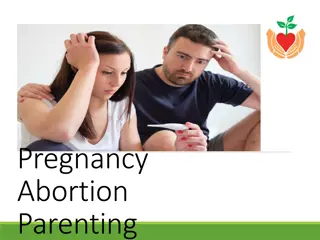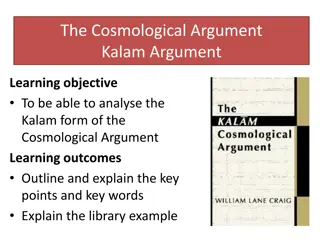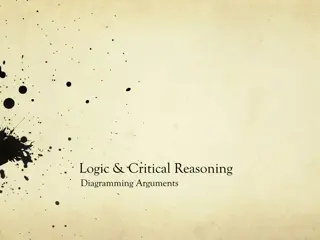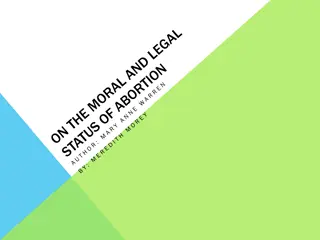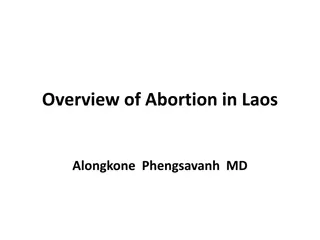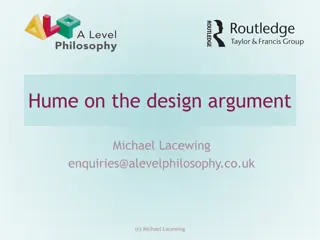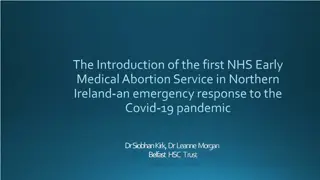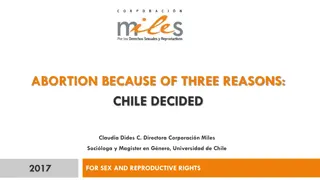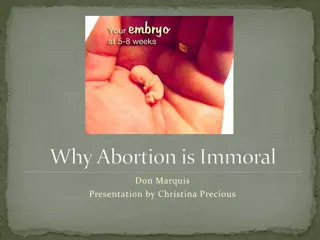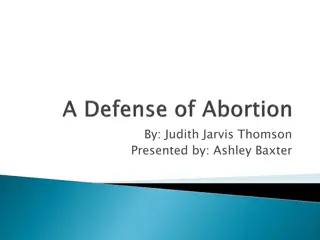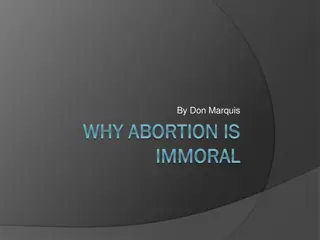Exploring Tooley's Argument on Abortion and Infanticide
Tooley challenges the common argument against abortion by proposing that fetuses and infants do not meet the Self-Consciousness Requirement (SCR) to have a right to life. He distinguishes between human and person, emphasizing the moral implications. The key questions raised revolve around the properties that define personhood and the developmental stages of Homo sapiens in relation to personhood. Tooley's criteria for personhood involve possessing the concept of self as a continuing entity. His perspective leads to the moral permissibility of abortion and infanticide based on the lack of self-consciousness in fetuses and infants.
Download Presentation

Please find below an Image/Link to download the presentation.
The content on the website is provided AS IS for your information and personal use only. It may not be sold, licensed, or shared on other websites without obtaining consent from the author. Download presentation by click this link. If you encounter any issues during the download, it is possible that the publisher has removed the file from their server.
E N D
Presentation Transcript
Tooleys Abortion and Infanticide
A common argument against abortion: (1) Every person has a right to life. (2)The fetus is a person from the moment of conception. (3) Hence, the fetus has a right to life. (4) It is wrong to kill something with a right to life. (5) Abortion is the killing of a fetus. (C) Hence, abortion is morally wrong.
Is this argument valid? Is it sound? Tooley thinks this argument is unsound. He denies that the fetus is a person. So he would deny (2)The fetus is a person from the moment of conception. and (3)Hence, the fetus has a right to life.
Tooley asks: What properties must an organism possess in order to be a person (i.e., to have a right to life)? His answer: An organism has a right to life only if it possesses the concept of a self as a continuing subject of experiences and other mental states, and believes that it is itself such a continuing entity.
Tooley calls this the Self-Consciousness Requirement (SCR). He holds that fetuses and infants fail to meet the SCR. So they do not have a right to life. Thus, abortion and infanticide are morally permissible.
Some Terminology: Tooley distinguishes between human and person. Human is a descriptive term; person is a moral term. X is human means X is a member of the species homo sapiens. X is a person means X has a right to life.
2 Key Questions: (1)What properties must an organism possess in order to be a person (to have a right to life)? (This is a moral question.) (2) At what point in the development of a member of the species Homo sapiens does the organism possess the properties that make it a person? (This is a purely factual question.)
Tooleys answer to (1): An organism possesses a serious right to life only if it possesses the concept of a self as a continuing subject of experiences and other mental states, and believes that it is itself such a continuing entity.
That is Self-Consciousness Requirement (SCR). SCR gives a necessary condition for personhood. If an organism does not satisfy the SCR, it is not a person. Is satisfaction of the SCR a sufficient condition for personhood? That is, if an organism satisfies the SCR, does it follow that the organism is a person? Tooley suggests that the answer to this question is Yes. But he does not defend this position in his paper.
Tooleys answer to (2): Shortly after birth. (Tooley doesn t say exactly when.) It is clear that fetuses do not satisfy the SCR and, hence, do not have a right to life. It is less clear at what point infants satisfy the SCR.
Tooleys Argument For The SCR: Stage One: (1)A has a right to X only if B has an obligation to refrain from acting in ways that would deprive A of X. (2)B has an obligation of this sort only if A desires X. (3)Hence, A has a right to X only if A desires X. [By 1 and 2.]
Stage Two: (4) A has a right to life only if A desires to live. (5) The right to life = the right to continue to exist as a subject of experiences and other mental states. (6) Therefore, A has a right to life only if A desires to continue to exist as a subject of experiences and other mental states. [By 4 and 5.]
Stage Three: (7) A desires to continue to exist as a subject of experiences and other mental states only if A has the concept of a self as a continuing subject of experiences and other mental states, and A believes that it is itself such a subject. (C) Hence, A has a right to life only if A has the concept of a self as a continuing subject of experiences and other mental states, and A believes that it is itself such a subject. [By 6 and 7.] The conclusion of this argument is the SCR.
Is the argument valid? Is the argument sound? A key step is premise (3): one has a right to X only if one desires X. But is this claim plausible? Tooley wants to qualify the claim to accommodate three kinds of situations which might suggest it is false.
Situation One: Lack of desire due to temporary psychological derangement. For example, suppose that I have become deeply, but temporarily, depressed and do not desire to live. We would still want to say that I have a right to life even though I do not (now) desire to live.
Situation Two: Lack of desire due to temporary unconsciousness. For example, suppose that I have become (temporarily) unconscious. It is not clear that we have desires when we are unconscious. If this is correct, then I do not (now) have a desire to live. But we would still want to say that I have a right to life.
Situation Three: Lack of desire due to brainwashing or indoctrination. For example, suppose that I have been brainwashed or indoctrinated such that I do not desire to live. We would still want to say that I have right to life.
These situations suggest the following qualification: A has a right to X only if A desires X (or A lacks such a desire due to temporary emotional imbalance, temporary unconsciousness, or brainwashing (indoctrination, etc.). Is this claim plausible?
To sum up, my argument has been that having a right to life pre- supposes that one is capable of desiring to continue existing as a subject of experiences and other mental states. This in turn presupposes both that one has the concept of such a continuing entity and that one believes that one is oneself such an entity. So an entity that lacks such a consciousness of itself as a continuing subject of mental states does not have a right to life.
Alternative Proposals (a) Viability (b) Birth (c) The ability to move spontaneously (d) The attainment of human form (e) Conception (the conservative position) Tooley argues that these alternative proposals are implausible.
Viability & Birth Why should the ability to survive outside the womb confer to one the right to life? If a fetus were conscious but were not viable, would we not say that nevertheless she has a right to life?
The ability to move spontaneously one certainly wants to ascribe a right to life to adult humans who are completely paralyzed.
The attainment of human form it is obvious that if we encountered other "rational animals," such as Martians, the fact that their physiological makeup was very different from our own would not be grounds for denying them a right to life.
Conception (the conservative position) The fetus is a person from the moment of conception, rests on two assumptions: (1) Adult humans automatically have a right to life, perhaps by virtue of some property. (2)If an organism has the potential to become an adult, then the organism has a right to life now.
Tooleys Argument Against The Conservative Position (1) Suppose a chemical when injected into the brain of a kitten causes the kitten to develop a brain like that possessed by humans (that enabled the kitten to think, use a language, etc.). (2) If adult humans have a right to life, then so would this cat. (3) But it would not be (seriously) wrong to refrain from injecting the kitten.
(4) So, it would not be (seriously) wrong to neutralize the development of an injected kitten (by, e.g., killing it). (5)But if it is not (seriously) wrong to neutralize the development of an injected kitten, then it is not (seriously) wrong to neutralize the development of a fetus (by killing it). (C)Hence, the fetus does not have a right to life.
